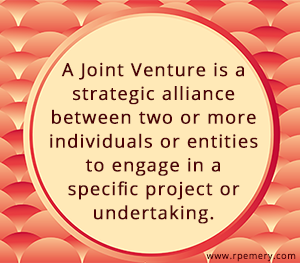There are many good business and accounting reasons to participate in a Joint Venture (often shortened JV). Partnering with a business that has complementary abilities and resources, such as finance, distribution channels, or technology, makes good sense. These are just some of the reasons partnerships formed by joint venture are becoming increasingly popular.
A joint venture is a strategic alliance between two or more individuals or entities to engage in a specific project or undertaking.

Partnerships and joint ventures can be similar but in fact can have significantly different implications for those involved. A partnership usually involves a continuing, long-term business relationship, whereas a joint venture is based on a single business project.
Parties enter Joint Ventures to gain individual benefits, usually a share of the project objective. This may be to develop a product or intellectual property rather than joint or collective profits, as is the case with a general or limited partnership.
A joint venture, like a general partnership is not a separate legal entity. Revenues, expenses and asset ownership usually flow through the joint venture to the participants, since the joint venture itself has no legal status. Once the Joint venture has met it’s goals the entity ceases to exist.
It takes time and effort to build the right relationship and partnering with another business can be challenging. Problems are likely to arise if:
Embarking on a Joint Venture can represent a significant reconstruction to your business. However favourable it may be to your potential for growth, it needs to fit with your overall business strategy.
It’s important to review your business strategy before committing to a joint venture. This should help you define what you can sensibly expect. In fact, you might decide there are better ways to achieve your business aims.
You may also want to study what similar businesses are doing, particular those that operate in similar markets to yours. Seeing how they use joint ventures could help you decide on the best approach for your business. At the same time, you could try to identify the skills they use to partner successfully.
You can benefit from studying your own enterprise. Be realistic about your strengths and weaknesses – consider performing strengths, weaknesses, opportunities and threats analysis (swot) to identify whether the two businesses are compatible. You will almost certainly want to identify a joint venture partner that complements your own skills and failings.
Remember to consider the employees’ perspective and bear in mind that people can feel threatened by a joint venture. It may be difficult to foster effective working relationships if your partner has a different way of doing business.
When embarking on a joint venture it’s imperative to have your understanding in writing. You should set out the terms and conditions agreed upon in a written contract, this will help prevent misunderstandings and provide both parties with strong legal recourse in the event the other party fails to fulfil its obligations while under contract.